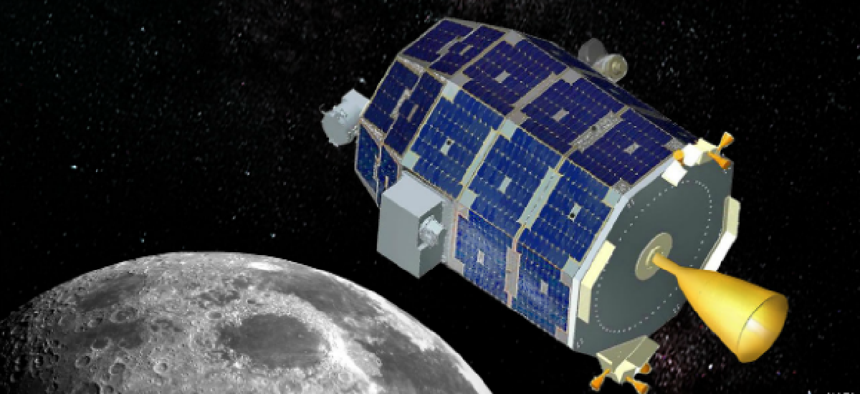Connecting state and local government leaders
As radio frequency communications near the limit for sending data in outer space, NASA says ultra-fast laser-based technology is ready to fill the role.
As radio communications approach the limit for sending data, a recent NASA project points the way toward the expanded use of lasers as the best technology for running networks in outer space.
The space agency last month released results of its 30-day Lunar Laser Communication Demonstration (LLCD), a project that tested laser-based data communications between NASA’s Lunar Atmosphere and Dust Environment Explorer, or LADEE, and ground stations on Earth. LADEE is a satellite that was launched last September on a 100-day mission to study the lunar atmosphere.
NASA said LLCD delivered download speeds of 622 megabits/sec and upload speeds of 20 megabits/ sec, a data transfer rate NASA described as “record-breaking.
The agency noted that radio frequency communications, NASA’s traditional method, “is reaching its limit as demand for more data capacity continues to increase.”
NASA said LLCD is the first NASA system to use lasers instead of radio waves for two-way communication. LLCD, according to the Massachusetts Institute of Technology’s Lincoln Laboratory, also set a distance mark for two-way laser communication, covering the 239,000 mile-span between the moon and the Earth. Lincoln Laboratory built the LLCD system.
In a statement, Don Cornwell, LLCD mission manager at NASA’s Goddard Space Flight Center, Greenbelt, Md., reported that LLCD’s performance, “demonstrates that this technology could serve as the primary communications system for future NASA missions.”
Rainer Martini, assistant professor of physics at Stevens Institute of Technology and director of the school’s Ultrafast Laser Spectroscopy and Communication Laboratory, said NASA’s laser demonstration is a step in the right direction and one that is “tremendously overdue.”
“There has been a lot of discussion of using optical systems for ... satellites,” he said.
Toward a less crowded spectrum
That discussion has focused on an approach called free-space optical communication. The technology takes advantage of the same principles used in fiber-optic communication – transmitting data via pulses of light – but offers the benefit of not needing physical media.
Free-space optical communication also lets NASA avoid the increasingly crowded radio and microwave segments of the electromagnetic spectrum. “Laser communications will enable NASA to work within a new, less crowded section of the electromagnetic spectrum,” the agency noted.
An important limitation of this form of optical communication is its susceptibility dust, clouds and solar interference. NASA reported “atmospheric turbulence did not significantly impact” the LLCD system, which the space agency said was also able to “communicate through thin clouds.”
While NASA and other research organizations continue to work on the interference problems, the space agency, says Martini, “has addressed some of the major problems.”
And further gains may be in the offing. NASA was able to get solid results using a relatively standard infrared laser with little customization, which suggests the agency’s optical initiative has room for improvement, Martini said. The agency could apply more advanced techologies and techniques, he noted.
Martini cited the use of longer wavelengths that are less sensitive to atmospheric interference, as one example. In addition, NASA could pursue other communications streams such as frequency modulation (FM) transmission, which also cuts down on environmental interference.
“I don’t think there is any big problem going for more distance,” Martini said. Similarly, improved laser systems should also be able to deal with cloudier atmospheres, he added.
How it works
NASA’s current take on laser communications relies on an electronic conversation between LLCD’s Lunar Lasercomm Space Terminal and its Lunar Lasercomm Ground Terminal. The space terminal, housed on the LADEE, transmits hundreds of millions of light pulses every second, according to NASA. Those data transmissions are downlinked to one of the ground telescopes supporting the demonstration. The telescopes operate in New Mexico, California and Spain.
The space terminal includes a modem module equipped with an infrared laser transmitter. LLCD uses a 4-inch diameter telescope to point the data stream toward the ground terminals.
Each ground terminal uses an array of transceiver and receiver telescopes. The telescopes are used to collect the optical data signals from the space terminal and to beam data back to the space terminal. The space terminal’s modem module houses a receiver that deciphers the data pulses dispatched from the ground, the agency noted.
The NASA demonstration found that LLCD was able to download LADEE’s entire store of science and spacecraft data – one gigabyte – in less than five minutes. That transfer would have taken several days is NASA had used LADEE’s onboard radio system.
Martini said space missions of this kind typically struggle with a data bottleneck when instruments record several measurements simultaneously and attempt to transmit data back to Earth. Laser communication, however, gets around this issue.
“That bottleneck doesn’t exist anymore,” he said, noting that much more data can be transmitted at the same time.
Encouraged by the LLCD results, NASA now plans a follow-on communications mission: Laser Communications Rely Demonstration. This project, which could run as long as five years, will test laser relay communications between two Earth stations using a satellite in geosynchronous orbit, according to NASA.
NEXT STORY: You think you've got challenges?



